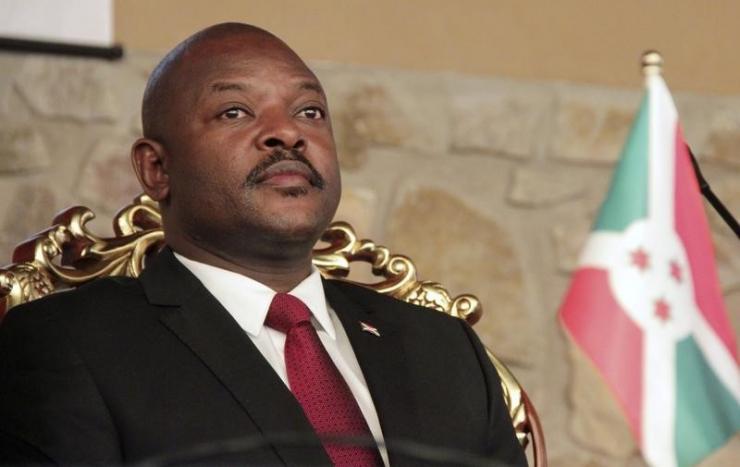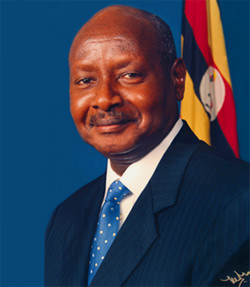Burundi Defies Museveni on inclusion of Rebels in talks
By EADM Correspondent and Agencies
In Summary: While Ugandan PRESIDENT Yoweri Museveni proposed to the Burundi government to accept the inclusion of armed opposition groups in the revamped peace talks to find a lasting solution to the political crisis in which hundreds have been killed, the government of Burundi flatly rejected the proposal saying those involved in armed attacks (rebels) against government had no place in the peace talks.

Kampala, Uganda—The government of Burundi has flatly and firmly rejected the inclusion of armed opposition groups in the revamped peace talks to resolve the political crisis in the tiny impoverished country which has left hundreds killed and thousands fleeing into exile in neighboring countries, agencies reported here Tuesday. “The government of Burundi would not engage in talks with groups that have declared war against the state. The people who participated in an attempted coup and those that have continued to declare war against the state have no place at the dialogue. They have violated the law and cannot be part of the process,” Alain Nyamitwe, Burundi’s minister for external affairs, who led his government delegation to the talks in Uganda, was quoted by international news agencies.

He was responding to a proposal by Ugandan President Yoweri Museveni, the mediator in the revamped talks between the Burundi government and opposition groups, who had suggested while opening the talks at State House Entebbe that the armed groups should be treated as innocent individuals to facilitate the dialogue to end the politically motivated violence that has engulfed the country since April. “You can go after the criminals after peace has been restored,” Museveni appealed.
President Museveni was selected by the third extraordinary summit of the East African Community heads of state on July 6 to chair and mediate the peace talks. The talks were attended by former presidents of Burundi, Uganda’s Prime Minister Dr. Ruhakana Rugunda, defense minister Dr. Crispus Kiyonga, Burundi development partners, representatives of the coalition of opposition parties (CNARED) in Burundi, and the Special Advisor to the UN Secretary General on Burundi, Jamal Benomoor, who told the meeting that the UN Security Council was ready to offer support toward the mediation process.
Museveni told the meeting that the ongoing extra-judicial killings in the East African nation should not be tolerated and warned that talks should not take forever. The crisis in Burundi broke out last April after president Pierre Nkurunziza launched a bid to run for a third term in office at the end of his two five-year term. The Burundi dialogue started on July 14, when Museveni visited Bujumbura, but efforts to keep the two sides talking by the Ugandan defense minister Dr. Crispus Kiyonga on behalf of Museveni did not make any headway. Dr. Kiyonga also announced January 6 as a tentative date for further dialogue in Arusha, Tanzania.
The coalition of opposition parties (CNARED), told the meeting in a joint statement delivered by the chair of the alliance, Leonard Nyangoma that the Burundi conflict has its origins in Nkurunziza’s violation of the constitution and the Arusha Agreement, which restricted the president to two terms in office. He dismissed claims that the crisis is rooted in the ethnic differences among Hutu and Tutsi ethnic groups. Nyangoma demanded the reinstatement of the Arusha accord and expressed support for the proposed deployment of African Union peacekeepers in Burundi. Fears are mounting that the crisis in Burundi may degenerate into genocide. However, the Burundian government has strongly objected to the proposal to deploy about 5,000 peacekeepers to avert the escalation of violence saying it would treat the deployment as ‘foreign invasion’. Last Saturday, thousands of Burundians led by Vice President Gaston Sindimwo went on the streets to protest against the AU’s proposed deployment.
A Burundi national resident in Boston Massachusetts, who only wanted to be identified as Faustino, USA told the EADM correspondent that the trouble with great lakes region in East Africa is greed for power by incumbent presidents who do not want to relinquish power at the end of their mandatory terms. But another Burundi national in Dallas, Severino, resident in New Orleans, Louisiana, USA, said that admitting a foreign force into the country would amount to surrendering Burundi’s sovereignty.


